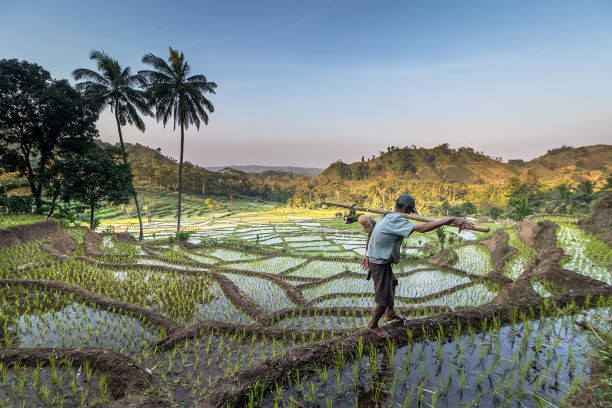Popular Reads
Top Results
Can't find what you're looking for?
View all search resultsPopular Reads
Top Results
Can't find what you're looking for?
View all search resultsMillennial farmers weather COVID-19 storm
Safari Munjin, a farmer and a Javanese literature graduate from the University of Indonesia, said on Friday that he had been able to boost his farming business, called Sayuran Pagi, during the health crisis, by maximizing promotion on social media.
Change text size
Gift Premium Articles
to Anyone
T
he country’s emerging millennial farmers are striving to weather the COVID-19 outbreak that has impacted the agriculture sector, with many relying on innovations in technology.
Safari Munjin, a farmer and a Javanese literature graduate from the University of Indonesia, said on Friday that he had been able to boost his farming business, called Sayuran Pagi, during the health crisis, by maximizing promotion on social media.
“We do not use complicated advertisements other than maximizing the potential of Sayuran Pagi’s Instagram account” Safari said in a virtual talk on Friday.
With the effort, he has booked a 50 percent increase in monthly revenue to Rp 7 million (US$473.97) since the beginning of 2020.
Safari and his seven friends – with the help of their former lecturer who has provided them with a house – have been running Sayuran Pagi for two years in Depok, West Java, selling various kinds of vegetables to more than 150 customers.
With harvests on Saturdays, they produce between 15 to 17 kilograms of vegetables each month.
“The key is maintaining our customers’ confidence,” said Safari. “After we place ads, there is usually one person who makes an order and they will tell their friends to buy vegetables from us without us having to ask for it. Hence, we believe that maintaining quality automatically boosts our customer base.”
Fewer young people are pursuing farming as a profession compared with previous generations. Only 23 percent of the country’s 14.2 million people aged between 15 and 24 worked in the agriculture, forestry and fishery sectors in 2019, data from the National Labor Force Survey showed.
Despite being an agriculture powerhouse, the country lost 5.1 million farmers between 2003 and 2013, with their numbers falling to 26 million, according to Statistics Indonesia (BPS).
One of the reasons is the lack of income, with farmers earning just around Rp 55,613 on average per day in July this year, up slightly by 0.2 percent from June, BPS data showed.
Read also: Investment, financing key to sustaining agriculture
At the same time, the agriculture sector has proven to be resilient during the pandemic, growing 2.19 percent year-on-year (yoy) in the second quarter this year, while Indonesia’s economy shrank 5.32 percent yoy.
Meanwhile, Ardiansyah, also a millennial farmer, suffered Rp 150 million in losses during the pandemic from the death of 12 of his cows, as the tofu factory on which he relied for feed was closed due to the COVID-19 pandemic.
“The biggest risk in cattle [business] is death,” said Ardiansyah. “The difficulty came only during the COVID-19 pandemic. There were no difficulties prior to that because the demand for milk exceeded our available stocks.”
Ardiansyah said he had followed in his parents’ footsteps by breeding cows and selling milk since 2011 after trying to develop other businesses.
When he inherited the business from his father, they only had two cows because his father had gone bankrupt. It took Ardiansyah eight years to rebuild the business.
Despite the impact of the pandemic on his business, he still has 80 cows and makes around Rp 45 million every month.
Vicky Shu, a celebrity-cum-business woman, said she expected the agriculture sector to keep growing amid the pandemic because it provided for people’s basic needs.
Vicky runs a grocery store in Jakarta, and hopes to sell agricultural products at affordable prices. She now plans to buy a field, expand her grocery store and start a poultry farm to sell chicken eggs.
“I am interested in buying a field because it will create jobs for people,” said Vicky, who took her pre-wedding photos in a field.
“I ran for office last year and engaged with a lot of farmers, socializing and listening to their stories. I was inspired,” she added.










